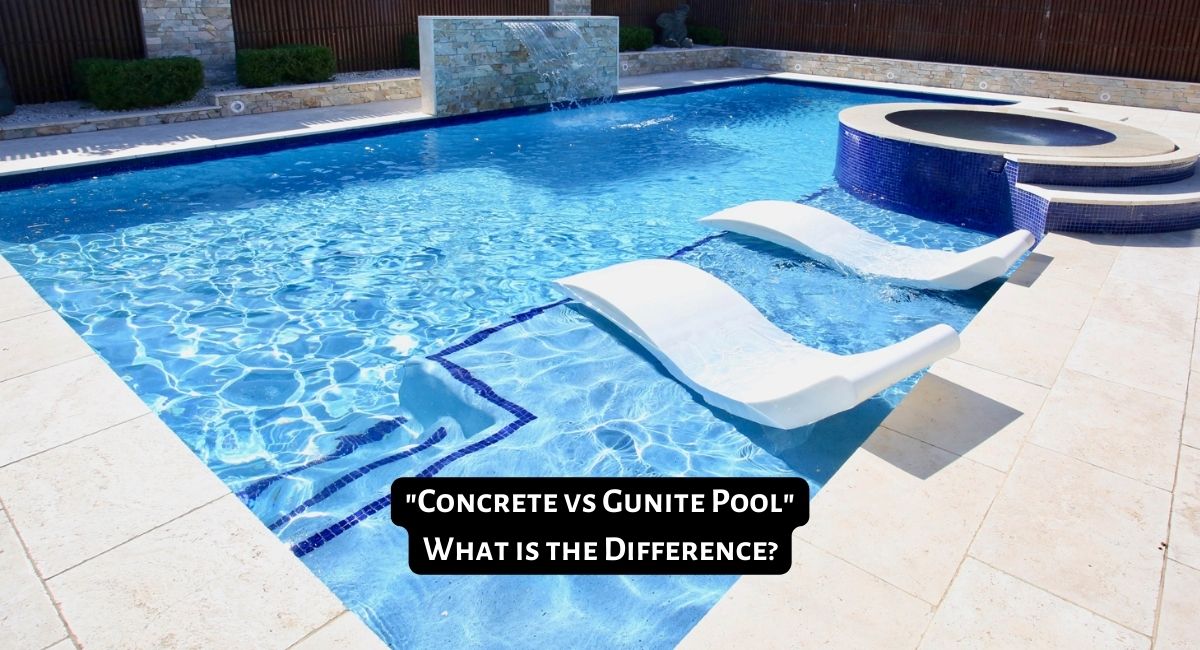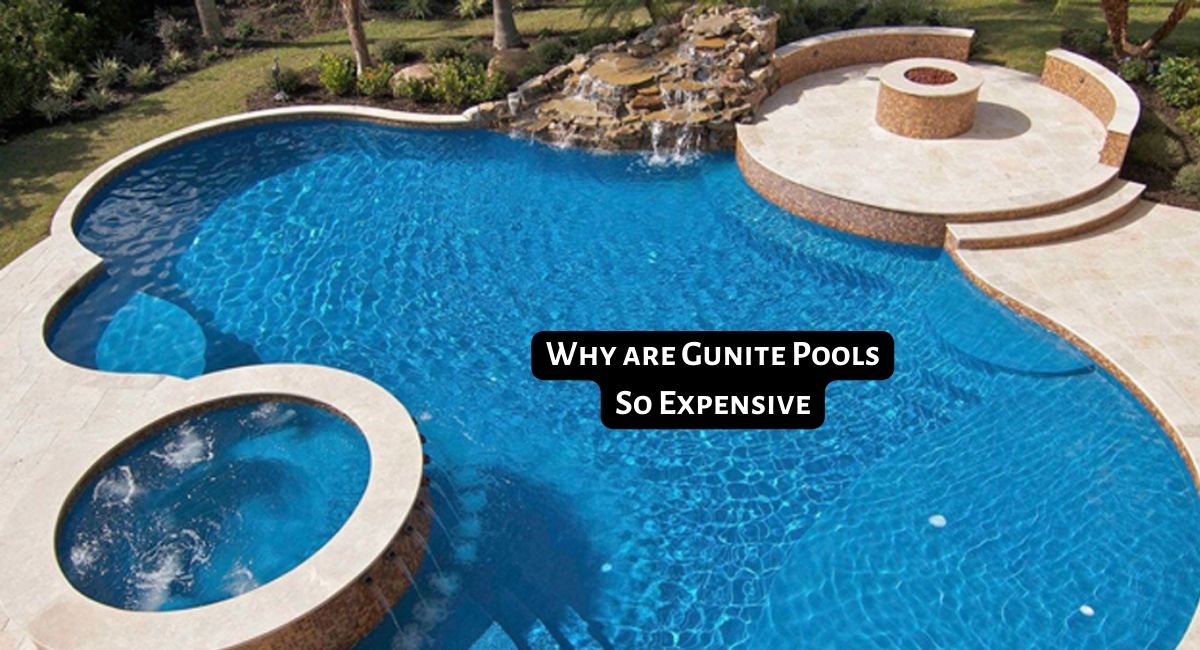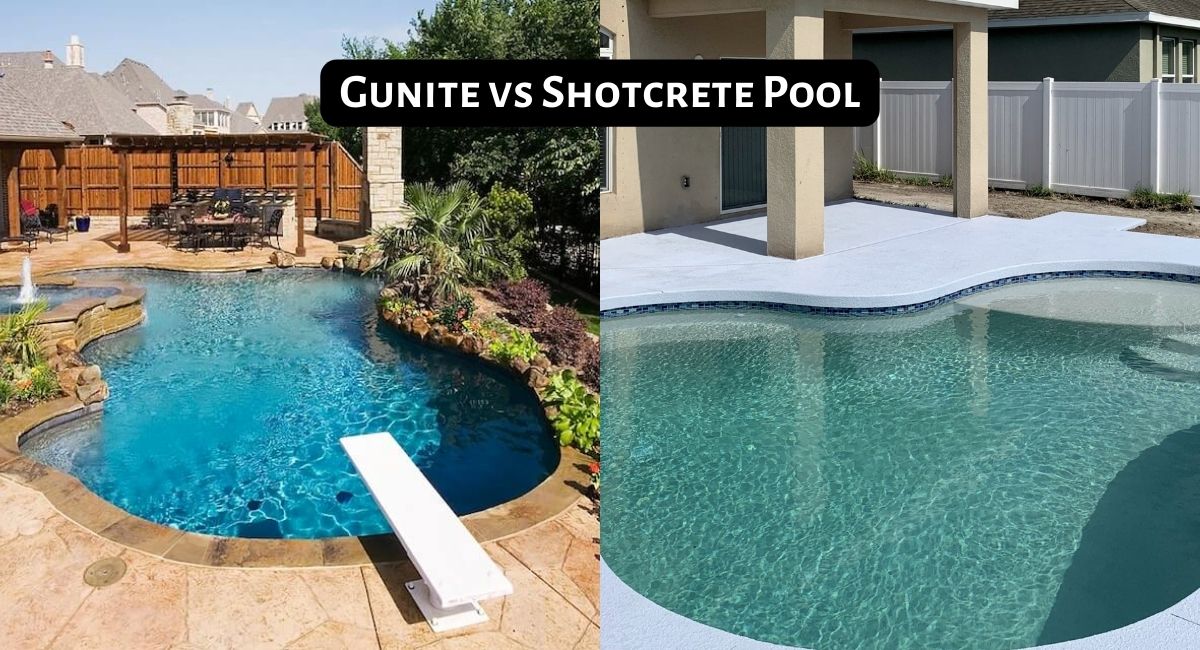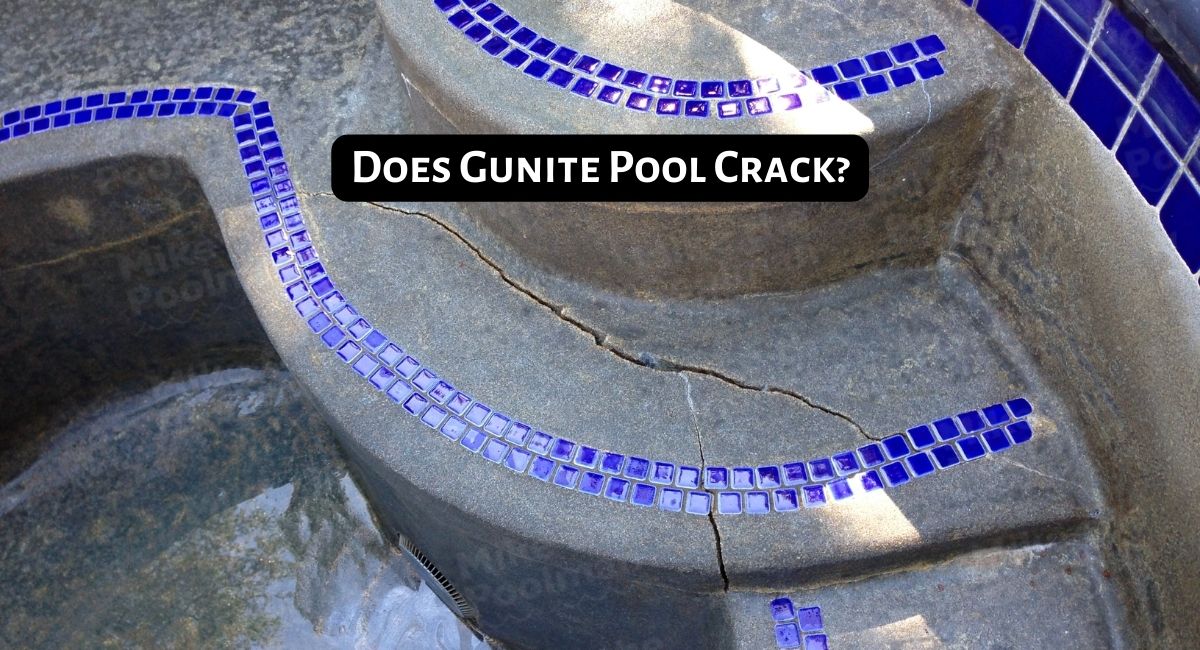When it comes to choosing the right inground pool for your home, Concrete vs Gunite Pool are two of the most popular options. Both offer quality and durability at a great price. But when comparing Concrete vs Gunite Pools, there are some key differences between them that you should consider before making a choice. Concrete pools offer more design flexibility while gunite pools are more durable and resistant to wear and tear.
In this blog, we’ll explore the differences between Concrete and Gunite Pools so you can make an informed decision about which option is right for you.
Table of Contents
What is a Concrete Pool?
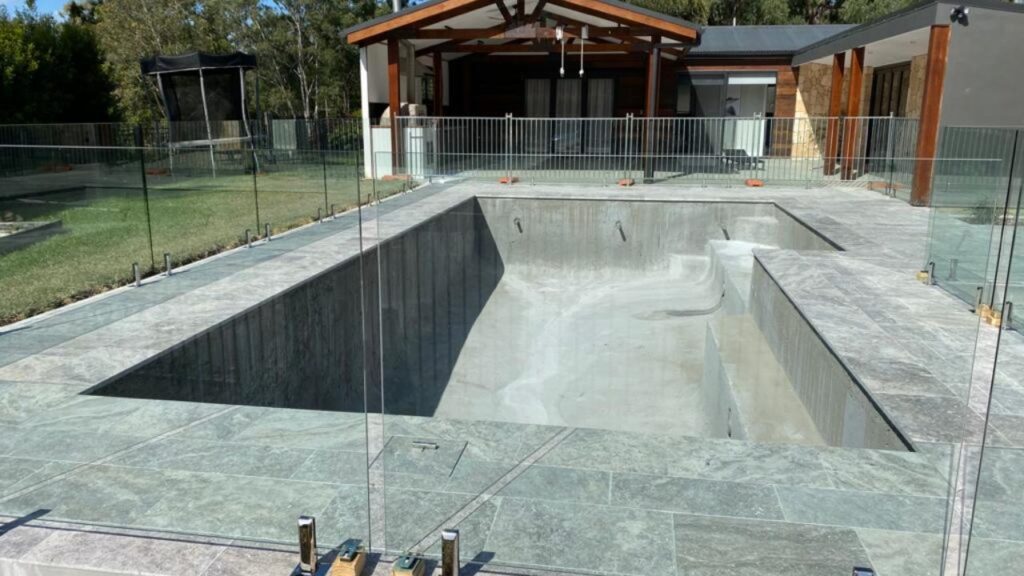
Concrete pools have been around for over a century and are still the most common type of pool. Concrete pools are made using reinforced concrete, which is poured into a form before being finished with plaster or tiles. Concrete pools are very durable and customizable, allowing homeowners to create unique shapes and depths that fit their style and needs.
The downside of concrete pools is that they can take several weeks to build and require regular maintenance in order to keep them looking pristine.
Advantages of Concrete Pools:
- Customization: Concrete pools can be fully customized to any shape, size, or depth, allowing homeowners to create a unique and personalized pool design that suits their preferences and complements their property.
- Durability: Concrete is a strong and durable material, making the pool resistant to damage from external elements and weather conditions. With proper maintenance, a well-constructed concrete pool can last for decades.
- Aesthetic Appeal: The surface of a concrete pool can be finished in various ways, such as plaster, tiles, or aggregate, providing an attractive and luxurious appearance that adds value to the property.
- Strength and Structural Integrity: Concrete pools can withstand considerable water pressure, making them suitable for areas with unstable soil or high water tables where other types of pools may not be as viable.
- Design Features: Concrete pools allow for the integration of various design features like waterfalls, integrated spas, beach entries, and underwater seating, offering a more luxurious and enjoyable swimming experience.
Disadvantages of Concrete Pools:
- Cost: Concrete pools are generally more expensive to build compared to other types of pools like vinyl liners or fiberglass pools. The initial construction cost can be significantly higher due to the labor and materials involved.
- Longer Installation Time: Building a concrete pool is a more time-consuming process, which can result in longer wait times before the pool is ready for use. The construction phase can last several weeks or even months, depending on the complexity of the design and site conditions.
- Maintenance: Concrete pools require regular maintenance, including re-plastering every 10-15 years, which can add to the overall cost of ownership. Additionally, concrete’s porous nature can make it susceptible to algae growth and staining, necessitating more frequent cleaning.
- Rough Surface: While some people prefer the textured surface of concrete pools, others may find it uncomfortable on their feet. The rough surface can potentially cause abrasions or skin irritation, especially for children who like to play in shallow areas.
- Chemical Absorption: Concrete is porous, which means it can absorb chemicals from pool water over time. This can lead to increased chemical usage and potential imbalances in water chemistry.
Also read: Gunite Pool vs Fiberglass Pool
What is a Gunite Pool?
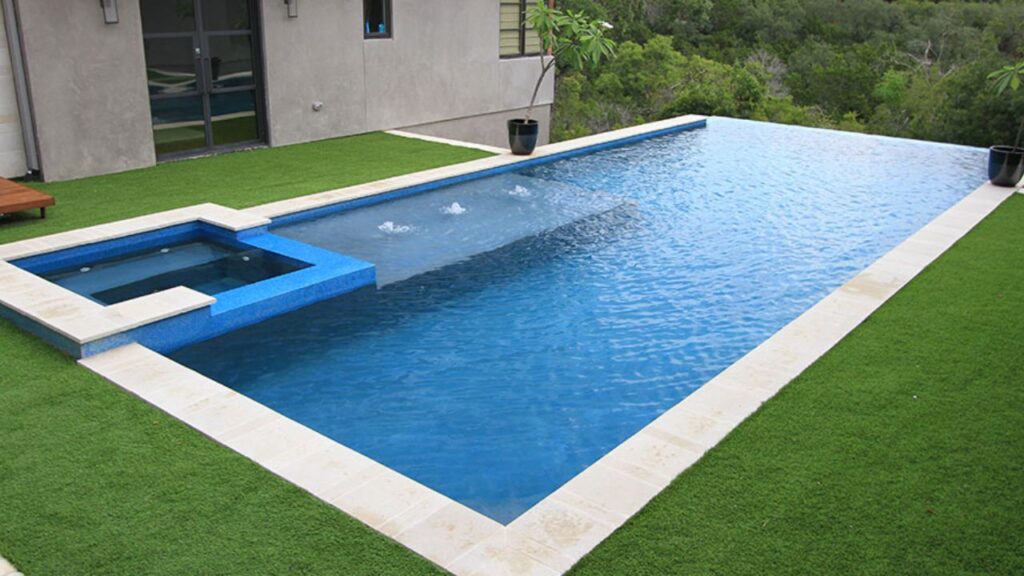
Gunite pools are concrete-based and made of a reinforced mix of sand, water, and cement. Gunite is sprayed in layers onto steel rods to form the pool’s shape. Gunite pools can be designed and formed into virtually any size or shape imaginable, allowing for maximum creative freedom. Gunite is highly durable and resistant to cracking, although the construction process requires more time and effort than fiberglass pools.
Gunite pools also require a higher maintenance commitment, as they are more susceptible to algae growth and other forms of wear and tear over time.
Gunite Pools tend to be more customizable than their fiberglass counterparts, allowing for a variety of shapes, designs, and depths. Gunite pools also offer the opportunity to add decorative features like waterfalls, spas, and other special touches that are not as easy with Fiberglass pools.
Advantages of Gunite Pools:
- Customization: Gunite pools offer complete design flexibility, allowing homeowners to create unique and personalized pool shapes, sizes, and features to suit their preferences and landscape.
- Durability: Gunite pools are highly durable and can withstand harsh weather conditions, soil movement, and external pressures, making them a long-lasting investment if properly maintained.
- Aesthetic Appeal: The surface of a Gunite pool can be finished with various materials like plaster, aggregate, or tiles, resulting in a luxurious and attractive appearance that enhances the overall aesthetics of the property.
- Strength and Structural Integrity: Gunite pools have exceptional structural integrity, making them suitable for regions with challenging soil conditions or areas prone to seismic activity.
- Design Features: Gunite pools allow for the integration of various design elements such as waterfalls, built-in spas, custom steps, and benches, enhancing the pool’s functionality and visual appeal.
Disadvantages of Gunite Pools:
- Cost: Gunite pools are more expensive to construct than other types of pools like vinyl or fiberglass pools. The initial installation cost can be higher due to the labor-intensive construction process and the need for specialized equipment.
- Construction Time: Building a Gunite pool is a time-consuming process, which may require several weeks or even months before it is ready for use. The complexity of the design and weather conditions can also affect the construction timeline.
- Maintenance: Like other concrete pools, Gunite pools require regular maintenance, including resurfacing every 10-15 years, to maintain the pool’s appearance and structural integrity. This can add to the overall cost of ownership.
- Rough Surface: The Gunite pool’s surface can be abrasive on the skin and cause discomfort, especially for sensitive swimmers or young children. Additional finishes, such as plaster or tile, can be applied to address this issue.
- Porosity: Gunite is porous, which means it can absorb pool water and chemicals over time. This can lead to water imbalances, increased chemical usage, and potential staining or algae growth.
Crucial Points to Remember for Concrete vs Gunite Pool
| Feature Point | Concrete Pools | Gunite Pools |
| Durability | Concrete pools have a higher durability than Gunite pools as they are made up of solid, reinforced concrete which makes them more resistant to weathering and wear. | Gunite pools on the other hand are built with a spray-on mixture of sand and cement, making them significantly less durable in comparison. |
| Installation | Concrete pools take longer to install compared to gunite pools because the installation process requires more labor and it is also dependent on good weather conditions. | On the contrary, gunite pools require comparatively less installation time since their material dries quickly and allows for quicker construction. |
| Maintenance | Concrete pools require more repairs and resurfacing over the years and they are also more prone to algae build up due to the porous nature of Concrete material. | Both Concrete and Gunite pools require regular maintenance such as cleaning and checking pH levels but Concrete pools need more maintenance than Gunite pools. |
| Lifespan | Concrete pools have a longer lifespan than Gunite pools, lasting around 30-50 years. | On the other hand, Gunite pools usually last for 15-20 years before needing any major repairs or resurfacing. |
| Cost | Concrete pools tend to be more expensive than gunite pools as Concrete is costlier in comparison and its installation process requires more labor. | However, the overall costs can vary based on factors such as size and complexity of design . |
| Design Options | Concrete allows for more creative designs with a wider range of shapes, colors and textures available. | Both Concrete and Gunite pools can be customized according to the owner’s preferences but Concrete pools tend to have more design options than Gunite pools. |
| Overall | Concrete allows for more creative designs with a wider range of shapes, colors, and textures available. | Concrete is known for its durability, allowing it to last longer than Gunite pools, whereas gunite has a quicker installation process with less maintenance required over time. |
Conclusion
Overall, Concrete vs Gunite Pool both offer quality and durability but depending on your needs and budget you should consider the pros and cons of each option before making a choice. If you’re looking for a pool that offers more design flexibility or one that is easy to install, Concrete pools may be the better choice for you. On the other hand, if you want something that is more durable and requires less maintenance in the long run, then Gunite pools may be the best option.
Ultimately, it comes down to personal preference when choosing between Concrete vs Gunite Pool so make sure you do your research before deciding which type of pool is right for you and your home.
Frequently Asked Questions (FAQs)
Is gunite better than concrete?
Concrete pools are generally cheaper than gunite pools, so if you’re cost-conscious or have a limited budget then concrete might be the better option for you. Concrete pools tend to require more frequent maintenance (such as re-plastering) while gunite is extremely durable and resistant to damage from weather, chemicals, and wear & tear due to their superior strength and material composition.
What are the cons of a gunite pool?
The primary disadvantage of a gunite pool is the higher initial cost. Gunite pools require more labor to construct and must be reinforced with steel rebar, making them more expensive than concrete pools. The maintenance for gunite pools can also be higher due to its porous surface, which makes it susceptible to algae and other contaminants. Finally, due to the nature of their construction, gunite pools can take longer to build than other types of pools. However, when properly maintained, a gunite pool can last much longer than a concrete pool and remain in better condition over time.
Is concrete the same as gunite?
Concrete and gunite pools are often confused, but they are two very different swimming pool construction methods. Concrete pools consist of poured concrete walls with a steel-reinforced base. Gunite is a combination of sand and cement that is sprayed onto metal rebar frames to form the pool walls. The major difference between these two types of pools is their durability. Concrete pools are more prone to cracking and need regular maintenance, while gunite pools are extremely durable and require minimal maintenance.
Which is more expensive gunite or concrete?
Concrete pools tend to be more expensive than gunite, as the gunite is a sprayed-on material made of cement and sand that can easily conform to pool shapes and sizes. Concrete pools are poured on site, resulting in a more labor intensive process. Concrete pools also require additional materials such as rebar and steel mesh for reinforcement.
